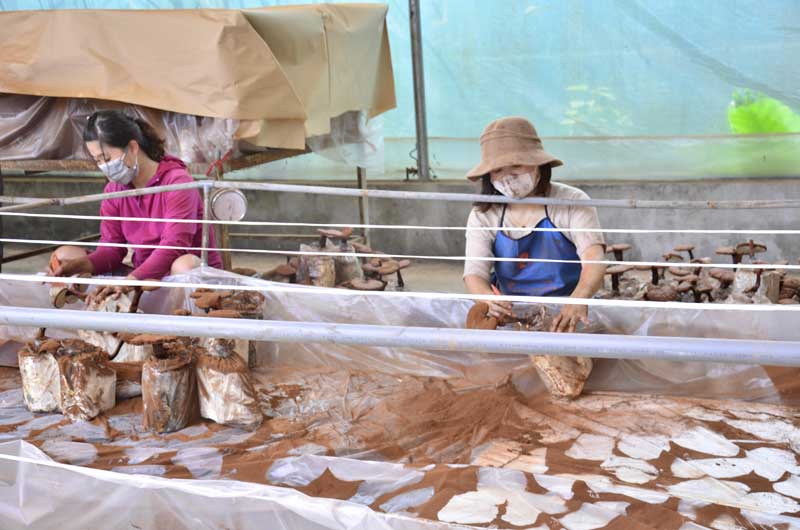
(HBO) - The red lingzhi mushroom grown on wood by the centre for scientific and technological advances application of Hoa Binh province was recently designated as a product of the local "One Commune, One Product” (OCOP) programme.
Staff
of Hoa Binh’s centre for scientific and technological advances application
harvest red lingzhi grown on substrate bags.
Earlier, the Department of Science and
Technology of Hoa Binh successfully conducted a research project on growing
lingzhi on fresh acacia wood and sawdust. The outcomes of this study were later
transferred to the province’s sci-tech application centre to further develop
and put into commercial production.
Unlike the popular method of cultivation of mushroom
on sawdust, the centre used a completely new technique that uses only fresh
acacia wood without any additives. Therefore, the quality of these lingzhi is
almost similar to those growing naturally.
To produce mushrooms that meet quality, size and
appearance standards, growers must adjust cultivation conditions according to
each development stage. When the light yellow caps turn brown, the mushrooms
are eligible for harvesting. At that time, each cap weighs about 200 grammes.
Each substrate bag can produce three harvests of
mushrooms. The first lingzhi can be picked in about three months, and the next
harvests in about 70 – 80 days.
By using the new technique, lingzhi prices can
be reduced to around 500,000 – 600,000 VND (21.6 – 25.9 USD) per kg, compared
to the current prices of up to several million VND per kg on the market.
With outstanding benefits for human health,
lingzhi mushrooms can be used as an ingredient of traditional medicine or as
tea for daily use. Tests have proved that lingzhi grown on fresh acacia wood
has high content of medicinal substances.
Therefore, farmers can grow lingzhi to supply
high-quality products with lower prices to consumers.
In the time ahead, the sci-tech application
centre will continue perfecting the mushroom tissue cultivating process and
developing the processing line to provide growing materials and create new
products like herbal tea and packaged lingzhi. This is expected to open up new
economic development chances and improve locals’ income./.
In Lac Thuy district, communes have been succeeded in promoting their One Commune-One Product (OCOP) products while others are still struggling to position their typical farming products in market. Some communes in the district still fail to have their products met OCOP programme’s requirements, while others have seen their certifications expired.
The inspectorate agency of Hoa Binh province has issued Official Dispatch No. 1090/TTr-PCTN to provincial departments, agencies, localities, business associations, enterprises, and investors regarding measures to improve informal component indexes of the Provincial Competitiveness Index (PCI).
Hoa Binh is taking concrete steps to improve its investment environment, with a strong focus on supporting businesses, settling obstacles for strategic investors, and creating opportunities for robust development in the coming years.
Under the blazing early summer sun, the construction site of Nhuan Trach Industrial Park (IP) in Luong Son district is abuzz with activities from dawn to dusk, a testament to the determination of the investor to meet their construction targets on schedule.



